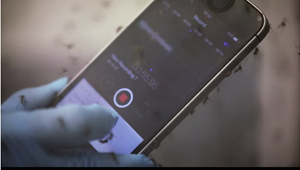By Rachel Leslie,
Stanford Global Health

Researchers at Stanford University are calling on citizens around the world to join in
Abuzz, a citizen science intiative to track mosquitoes and help prevent the spread of disease.
Published
last week in eLife and presented at TropMed17, research from Stanford’s Prakash Lab, showed that anyone with a basic mobile phone can be a mosquito tracker, simply by capturing an audio recording of a mosquito’s whining buzz.
“There are more than 40 species of mosquitoes which spread different diseases, with a variety of biting habits and lifestyles. If we knew where and when to find mosquitoes, and what kind, we could target strategies against them,” said lead author Haripriya Mukundarajan, a Stanford graduate student who presented the research this week.
Mosquito sound is useful for mosquito tracking because wingbeat frequencies can be used to identify a mosquito by its species, explained Mukundarajan, who presented the research this week. While many species – like
Ae. aegypti and
Ae. gambiae – have overlapping frequencies, cellphones recordings provide time and location data, the “secret sauce” for mosquito identification, said Mukundarajan.
Cellphones provide a simpler alternative to other methods of collecting mosquito field data involving traps and reagents. A pilot field trial in Madagascar showed success using mobile phone recordings to map mosquito species in the field more efficiently than conventional methods.
According to Mukundarajan, just a second’s worth of audio is enough to identify a mosquito by its species. She also found no variation of sound quality between older mobile phone models and newer smartphones, signaling a scalable global solution.
So far, the Stanford team has created a mosquito acoustic database including of about 1,000 sound files of mosquito buzzing from 20 different species, all of which are relevant to human health. They hope to grow this database to include millions of mosquito recordings with a newly launched
Abuzz web platform through which individuals around the world can upload their own audio segments.
The Stanford Abuzz Project is aiming to create real-time maps depicting location, abundance and species of mosquitoes and track the ones that spread deadly human diseases like malaria, dengue and Zika. The data will be made publicly available from an online repository on dryad.org.
“Tracking mosquitoes over time can improve our disease tracking, but we need a lot of field data,” said Mukundarajan. “We hope you’ll answer our call.”